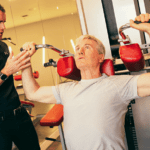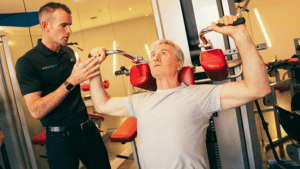Menopause – It is that stage of a women’s life which is unavoidable and can be unpleasant. It’s not exciting because this transition comes with a bunch of health issues and those symptoms can last for years.
So, what does Menopause bring?
Studies suggest that 80-90% of women experience mild to severe physical or physiological problems when approaching Menopause (Source: Reference 1).
In women, Estrogen ( and especially the hormone Estradiol) plays a vital role in the growth and continuance of female characteristics. It is also crucial for regulating metabolism and body weight.
Sadly, as women get older, Estrogen levels start to drop. This decline in menopause women affects the bone mineral density and vasomotor symptoms (including body heat or night sweats) (Source: Reference 2).
Women may also start gaining weight, and studies have demonstrated that women who gained weight during Menopause reported a deteriorated quality of life (Source: Reference 1).
More worryingly, many other studies have indicated that the decline of Estrogen is also associated with an elevated risk of cardiovascular diseases, diabetes, obesity, hypertension, dyslipidemia (abnormal amount of lipids such as triglycerides, cholesterol and/or fat phospholipids in the blood), and liver disease (Source: Reference 3).
When Do Women Enter into Menopause Transition?
Well, for now, there is no exact age when Menopause can hit a woman. But, according to The North American Menopause Society NAMS), it is suggested that the average age is 50 years. However, NAMS also stated that the age of natural Menopause varies widely from 40 to 58 years.
This can also be a time in a women’s life when they are very busy trying to achieve a lot —family, career, and community commitments. All of this can contribute greatly to mental stress, which can impact the overall well-being of women.
The latest report from the CSO (central statistics office) recently published that there are nearly 333,000 women in Ireland who are potentially peri-menopausal (the period of time during which your body makes the natural transition to menopause) at any one time, which is undoubtedly a significant number.
How can we make the transition better?
Apart from Hormonal Replacement Therapies, treatments and other available medications, experts suggest that changes in lifestyle to include physical activity, nutrition, and mindfulness can improve the quality of life.
Two studies used the Profile of Mood States (POMS) and Women’s Health Questionnaire (WHQ) to examine the effects of exercise among four groups of Menopausal women. The groups included 1. premenopausal 2. peri-menopausal 3. postmenopausal without HRT and 4. postmenopausal with HRT.
As revealed by the studies, the exercisers’ moods were significantly more positive than sedentary women, regardless of menopausal state. Exercising women also scored lower on somatic symptoms (essentially the physical symptoms experienced during menopause) and memory-concentration difficulties (Source: Reference 4).
Another study reported that exercise has beneficial effects on hot flushes, well-being, body mass index, and coronary heart disease risk (Source: Reference 2).
Like it or not, every woman has to pass through Menopause. It is understood that Menopause affects every woman differently, and exercise can help in alleviating those associated symptoms. But, does this mean that all types of exercises will have the same benefit? Not necessarily. We will look at what is the best type of training or exercise for Menopausal women in our future blog posts.
Hope you like this blog. If you did, please do share it with your friends and family
References:
1.Twelve-week exercise training and the quality of life in menopausal women – clinical trial. Jolanta Dąbrowska, Magdalena Dąbrowska-Galas, Magdalena Rutkowska, Bogdan Adam Michalski. Prz Menopauzalny. 2016 Mar; 15(1): 20–25. Published online 2016 Mar 29. doi: 10.5114/pm.2016.58769. PMCID: PMC4828504
2. Modeling women’s health during the menopausal transition: a longitudinal analysis. Dennerstein L1, Lehert P, Guthrie JR, Burger HG. PMID: 17023873
3. Menopause: highlighting the effects of resistance training. Leite RD1, Prestes J, Pereira GB, Shiguemoto GE, Perez SE. DOI: 10.1055/s-0030-1263117. PMID: 21058218
4. Mood and symptom reporting among middle-aged women: the relationship between menopausal status, hormone replacement therapy, and exercise participation. Slaven L1, Lee C, Health Psychol. PMID: 9152697








